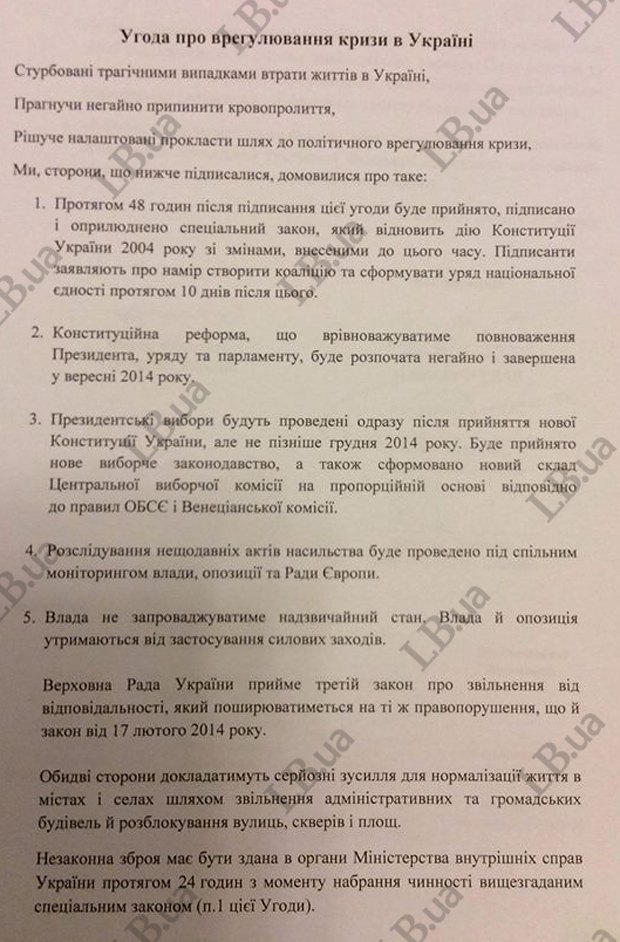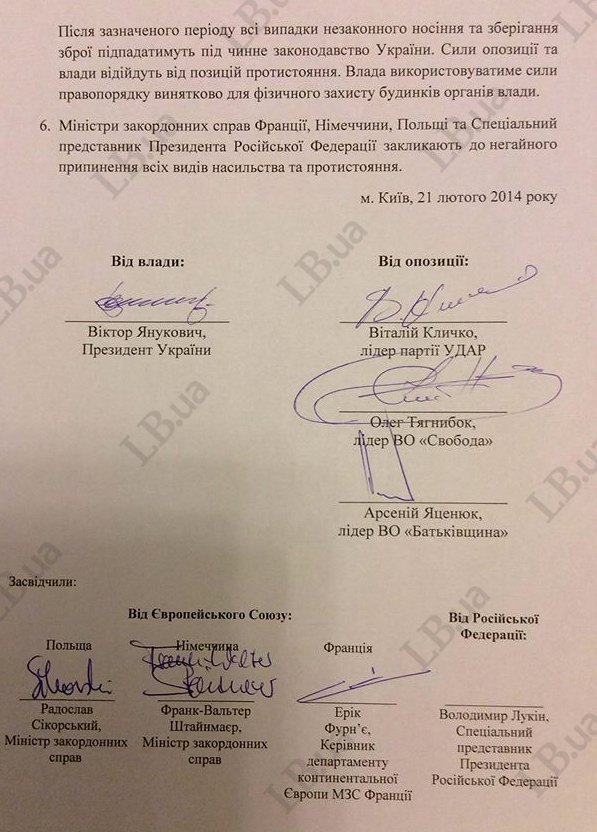Russian propaganda claims: there was a coup d'état in Ukraine in 2014 and Yanukovych was illegally removed.
There was no coup d'état (State coup) in 2014. President Yanukovych removed himself from the fulfillment of his constitutional duties
After the murders started during the Maidan 2014, in order to stop the violence, the Opposition and the President Yanukovych decided to make a the first step towards a settlement of the crisis.
On February 21, 2014, in Kyiv, President Viktor Yanukovych, opposition representatives (Arseniy Yatsenyuk, Vitali Klitschko and Oleh Tyahnybok) and representatives from EU (Frank-Walter Steinmeier, Radosław Sikorski, Éric Fournier) gathered and signed the agreement.
Agreement with Opposition
Agreement on the Settlement of the Crisis in Ukraine
Concerned about the tragic loss of life in Ukraine,
Striving for an immediate end to bloodshed,
Determined to pave the way for a political resolution of the crisis,
We, the undersigned parties, have agreed as follows:
Within 48 hours of signing this agreement, a special law will be adopted, signed, and published, restoring the 2004 Constitution of Ukraine with amendments made up to this time. The signatories declare their intention to create a coalition and form a government of national unity within 10 days thereafter.
A constitutional reform aimed at balancing the powers of the President, the government, and the parliament will begin immediately and be completed by September 2014.
Presidential elections will be held immediately after the adoption of the new Constitution of Ukraine, but no later than December 2014. A new electoral law will be adopted, and a new composition of the Central Election Commission will be formed on a proportional basis in accordance with OSCE and Venice Commission regulations.
An investigation into recent acts of violence will be conducted under joint monitoring by the authorities, the opposition, and the Council of Europe.
The authorities will not impose a state of emergency. The authorities and the opposition will refrain from the use of force.
The Verkhovna Rada of Ukraine will adopt a third law on amnesty, covering the same offenses as the law of February 17, 2014.
Both sides will make serious efforts to normalize life in cities and towns by vacating administrative and public buildings and unblocking streets, squares, and public spaces.
Illegal weapons must be surrendered to the Ministry of Internal Affairs of Ukraine within 24 hours after the aforementioned special law (Clause 1 of this Agreement) comes into force.
After this period, all cases of illegal possession and carrying of weapons will be subject to the current legislation of Ukraine. Opposition and government forces will withdraw from their confrontation positions. The authorities will use law enforcement forces exclusively for the physical protection of government buildings.
- The Ministers of Foreign Affairs of France, Germany, and Poland, along with the Special Representative of the President of the Russian Federation, call for the immediate cessation of all forms of violence and confrontation.
Kyiv, February 21, 2014

 Source: LB.UA
Source: LB.UA
 Source: Pravda.com.ua
Source: Pravda.com.ua
Agreement wasn't signed by russian envoy Lukin. He just ignored the meeting.
What happened next
According to paragraph 1 of this agreement, Yanukovych had to sign the adopted law, which restored the 2004 Constitution of Ukraine(in the version dated December 8, 2004) with amendments made up to that time (February 21, 2014). Yanukovych, as the legitimate President, had only two options either to sign the law or to veto it:
sign laws adopted by the Verkhovna Rada of Ukraine;
have the right to veto laws adopted by the Verkhovna Rada of Ukraine (except for the laws on introducing amendments to the Constitution of Ukraine) with their subsequent return for reconsideration by the Verkhovna Rada of Ukraine;

Source: Constitution of Ukraine (Eng)
He didn't sign it. Accordint to V. Yanukovych's statement he would not sign any law passed by "bandits." This is how he referred to the members of parliament who, like Yanukovych himself, were elected by the people. Even the President of Russia considered the parliament "partially legitimate". If Yanukovych wanted to maintain his claimed status as the legitimate head of state, he should have declared his unconditional commitment to fulfilling his duties and at least vetoed the laws passed by parliament. However, to do so, he needed to remain at his workplace (what he didn't do).
According to the Constitution of Ukraine, the President can leave office only under the following articles:
Article 108
Article 108. The President of Ukraine exercises his powers until the newly elected President of Ukraine assumes office.
This wasn't the case.
According to the Constitution:
The powers of the President of Ukraine terminate early in the event of:
resignation;
inability to perform duties due to health conditions;
removal from office through impeachment;
death.
Article 109
Article 109. The resignation of the President of Ukraine takes effect from the moment he personally announces it at a session of the Verkhovna Rada of Ukraine.
This wasn't a case.
Article 110
Article 110. The inability of the President of Ukraine to perform duties due to health conditions must be established at a session of the Verkhovna Rada of Ukraine and confirmed by a decision adopted by the majority of its constitutional composition, based on a written submission from the Supreme Court of Ukraine—at the request of the Verkhovna Rada of Ukraine—and a medical report.
This wasn't a case.
Article 111
Article 111. The President of Ukraine may be removed from office by the Verkhovna Rada of Ukraine through impeachment in the event of committing high treason or another crime.
As of 2014, the article on impeachment existed in the Constitution of Ukraine, but there was no law detailing the procedure for impeachment. Such a law was signed by President Volodymyr Zelenskyy in 2019. Therefore, it was not possible to impeach President Yanukovych.

Source: Constitution of Ukraine (Eng)
Thus, the Verkhovna Rada, lawfully elected by the people of Ukraine, acting under the legal concept of analogy of law, addressed the constitutional gap in a situation where the President, in violation of the law, willfully evaded the fulfillment of his legally assigned presidential duties by fleeing the country.
Resolution of the Verkhovna Rada
On February 22, 2014, the Verkhovna Rada adopted a resolution "On the Self-Removal of the President of Ukraine from Exercising Constitutional Powers and the Appointment of Early Presidential Elections," which stated that V. Yanukovych had unconstitutionally removed himself from exercising his constitutional powers and was therefore not fulfilling his duties:
RESOLUTION
of the Verkhovna Rada of Ukraine
On the Self-Removal of the President of Ukraine from the Fulfillment of Constitutional Powers and the Appointment of an Early Presidential Election in Ukraine
Considering that the President of Ukraine, V. Yanukovych, has self-removed himself from exercising his constitutional powers, which threatens the governability of the state, the territorial integrity and sovereignty of Ukraine, and leads to mass violations of citizens' rights and freedoms; based on the circumstances of extreme necessity; and expressing the sovereign will of the Ukrainian people, the Verkhovna Rada of Ukraine hereby resolves:
To establish that the President of Ukraine, V. Yanukovych, has unconstitutionally self-removed himself from exercising his constitutional powers and is therefore not fulfilling his duties.
Pursuant to point 7 of part one of Article 85 of the Constitution of Ukraine, to schedule an early presidential election in Ukraine for May 25, 2014.
This Resolution enters into force upon its adoption.

Source: the Verkhovna Rada website
The appointment of Oleksandr Turchynov as Acting President of Ukraine.
On February 23, 2014, 48 hours after signing the agreement with the opposition, the Verkhovna Rada of Ukraine adopted a second resolution "On Assigning the Duties of the President of Ukraine to the Chairman of the Verkhovna Rada of Ukraine in Accordance with Article 112 of the Constitution of Ukraine," thereby assigning the duties of the president to the Chairman of the Verkhovna Rada, Oleksandr Turchynov.
Considering that the President of Ukraine, V. Yanukovych, has self-removed himself from exercising his constitutional powers, the Verkhovna Rada of Ukraine resolves:
To assign the duties of the President of Ukraine to the Chairman of the Verkhovna Rada of Ukraine, Oleksandr Valentynovych Turchynov, in accordance with Article 112 of the Constitution of Ukraine.
This Resolution shall take effect from the moment of its adoption.

Source: Verkhovna Rada website
Conclusion
There was no coup d'état (State coup) in 2014. President Yanukovych removed himself from the fulfillment of his constitutional duties. The legitimate Ukrainian parliament scheduled an early presidential election and, according to the constitution, appointed Oleksandr Turchynov as Acting President.
What's next
We invite you to read our next Article: "[Fake] Ukraine’s desire to join NATO was the reason of the war"
